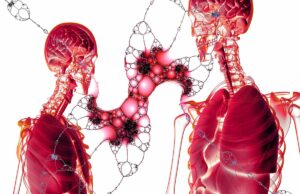Evolution is a process of biological change that all organisms undergo over time, through which biological variants are produced which generate all the vast diversity of life forms that we can appreciate around us. The mechanisms that produce these variants are mainly natural selection, as well as a set of complex ontogenetic dynamics 1, which when they interact reciprocally with the different ecological and cultural niches, shape anatomical, physiological features, and even in some complex organisms such as human beings can also modulate behavior. In this sense, evolution is then not only a verifiable biological phenomenon, explained in the light of a theory, which, as part of the fundamental assumptions of science, is still under permanent construction. It is also a process that directly affects everything we are and everything we do as living beings, including, of course, human moral aspects.
[1] Ontogeny is the process of formation and development of an organism, due to the fusion of male and female gametes (zygote) during sexual reproduction, going through their sexual maturation, their adult form, until their senescence.
In 1836, an article was published in the South African Christian Recorder, entitled “The Moral State of Tahiti.” You may be familiar with its authors: Robert FitzRoy, and a young man named Charles Darwin. The text is specifically a racist defense of the “kind” activities that the English Christian evangelizing missionaries carried out in Tahiti and New Zealand. The text made reference to the comments from the Russian explorer Otto Von Kotzebue, who argued that, in reality, the Christian missionaries had been much more harmful than beneficial for these populations, and that had only served as a cover for European colonialist ambitions 1.
Evolution is then not only a verifiable biological phenomenon, explained in the light of a theory, which, as part of the fundamental assumptions of science, is still under permanent construction. It is also a process that directly affects everything we are and everything we do as living beings, including, of course, human moral aspects.
After generally defending the activities of the evangelizers, Darwin and FitzRoy focused their comments on what they called the “improved” moral state of Tahiti:
It would be desirable to see what has been done in Otaheite (now called Tahiti) and New Zealand to convert the barbarians… the Beagle stayed a part of last November in Otaheite or Tahiti. I have not seen in any other part of the world a more orderly, peaceful and inoffensive community 2.
Of course the authors knew that regardless of the missionaries’ action, the Tahitians had probably always been decent, so, in the rest of the text, they focused on building some arguments defending the influence of missionaries on these individuals. They were opposed to the Tahitian interpretation of “natural” goodness, or the idea of being born without sin. Darwin himself emphasizes that before the arrival of Western civilization, the Tahitians were a rather “dubious” people:
In general, I think that the state of morality and religion in Tahiti is very estimable … human sacrifices, the bloodiest wars, parricide and infanticide, the power of idolatrous cults, and a system steeped in lust unparalleled in the annals of the world; all of this has been abolished. Hypocrisy, debauchery, intemperance, have been greatly reduced thanks to the introduction of Renaissance Christianity.3
All these allegations between FitzRoy and Darwin against Von Kotzebue, or between Meliorists, had something in common: they saw some peoples as primitive in a progressive Eurocentric sense, but with the ability to improve, definitely, by westernizing themselves. This contrasted with the views of biological determinists who consider other cultures as incapable of altering their lower cognitive condition, thereby justifying colonialism, slavery, racism 4 and, in short, a perpetual ideological and economic domination -something that Darwin himself once again emphasized in The Descent of Man, in 1871-. This finally refers us to the debate between the Machiavellian ethical conception of human nature that postulates congenital evil, against the moral paradigm of innate human goodness, the myth of the good savage of Rousseau 5, but above all, it rekindles the old anthropological conflict between nature and nurture, and I would say more, between phylogeny versus ontogeny.
This finally refers us to the debate between the Machiavellian ethical conception of human nature that postulates congenital evil, against the moral paradigm of innate human goodness, the myth of the good savage of Rousseau, but above all, it rekindles the old anthropological conflict between nature and nurture, and I would say more, between phylogeny versus ontogeny
Like anything related to behavior, morality has a biological past, evidently linked to the evolutionary process of cognitive functions in primates, which has allowed the emergence of complex social behaviors, such as the one that characterizes humans. But that’s not everything, and it is here where I return to the debate: it is evident that, what humans call “morals”, i.e., that set of principles, values, beliefs, customs and traditions mediated socially that regulate and norm our behavior based on values and judgments that permeate our decision-making, with the aim of establishing “good” social relationships, have enormous affinity with different components of social behavior observed in many animals, mainly among apes 6.
Before the first religions, the Aristotelian ethical and dianoethical virtues or Kantian Deontologism appeared, there were already some basic cognitive elements for the construction of a moral scheme, as part of an innate social package among various mammals, of course including primates. Paraphrasing Frans de Waal, empathy, compassion, reciprocity, even justice and fairness, were not invented during the French Revolution, they are cognitive elements disseminated among many animals, such as human beings, which together produce a greater capacity for pro-social behavior.
But, although humans, like our simian relatives, evolved in small groups, cooperated and were sensitive to the needs, intentions and mood of other members of our group, thus promoting limits to our selfish interests, something fundamental to species survival 7, we have moral behaviors much more complex than the sum of these cognitive elements. This is because we have built a cultural niche, which among many other things, has been in charge of making our neuronal biology more complex. We are able to move from a basic primate social perception -of right and wrong- to the contextual implementation of rules, punishments and laws that in an institutionalized way regulate our behavior, thus shaping our cognitive capacity to perceive “good and evil”, from of a particular learning niche.
Like practically no other living being, humans are not good or bad by nature. We are not born Machiavellian or Rousseauian. We simply have some biological capacities, a product of our evolutionary process, that negotiate certain prosocial behaviors. But finally, it is the ecological, social and cultural context in which we develop, which contributes significantly, through learning, to the construction of our moral values.
We are not born Machiavellian or Rousseauian. We simply have some biological capacities, a product of our evolutionary process, that negotiate certain prosocial behaviors. But finally, it is the ecological, social and cultural context in which we develop, which contributes significantly, through learning, to the construction of our moral values.
During all this pandemic time that we have lived, we have seen countless moral behaviors parade, some of them highly empathic and cooperative, but we have also seen -and mostly- little supportive, immature, selfish and even irrational behaviors, such as hoarding food, medicines and now also vaccines, as well as little empathy for the sick people, and for those who care for them, and of course, for the socially less favored. We have even witnessed painful cases in which health professionals, people close to governments, and well-positioned individuals, taking advantage of their privileged status, have tried to evade the ethical health protocols that attempt to scientifically regulate the vaccination process in a social, fair and equitable way, to favor themselves and their families before others. Moreover, we have witnessed all the enormous amount of fake news that floods the media, which have prioritized political and economic interests, to the detriment of the enormous scientific effort to alleviate the physical, economic and emotional beating that the pandemic has caused in people.
Of course, the text of Darwin and FitzRoy, together with their enormous racist prejudices, unintentionally shows us that, in effect, human morality is a subject that, beyond innateness, is built during ontogeny, through learning, and above all, during childhood and adolescence, moments in which our neurodevelopment is much more susceptible to the influence of the ecological, social and cultural environment. So SARS-CoV-2 can be all harmful to our body, as we have not seen in a long time, but, by taking up a little the teachings contained in The Plague, by Camus, it is clear that the worst of an epidemic (in this case, a pandemic) is not necessarily the biological part, but the moral part. Morality, which like anything else linked to biology, is not only a matter of nature, but also of upbringing, of learning.
So SARS-CoV-2 can be all harmful to our body, as we have not seen in a long time, but, by taking up a little the teachings contained in The Plague, by Camus, it is clear that the worst of an epidemic (in this case, a pandemic) is not necessarily the biological part, but the moral part. Morality, which like anything else linked to biology, is not only a matter of nature, but also of upbringing, of learning.
References
1 S. J. Gould, The Moral State of Tahiti, and of Darwin. Natural History, pp. 12-19, October, 1991.
2 Robert FitzRoy and Charles Darwin, A letter, containing remarks on the moral estate of Tahití, New Zealand. South African Christian Recorder, pp. 221-238, September, 1836.
3 Ibid pp. 221-238.
4 Ibid pp. 12-19
5 Lionel A. Mckenzie, “Rousseau’s Debate with Machiavelli in the Social Contract”. Journal of the History of Ideas, vol. 43, number 2, April-June, 1982.
6 Frans de Waal, The Bonobo and the Atheist. W.W. Norton and Company, New York, 2013.
7 Ibid
Trained as a biological anthropologist, he is a doctoral student at the National School of Anthropology and History (ENAH), where he studies the processes that develop creativity and innovation in humans, within the framework of institutional education, under the guidance of the professor Agustín Fuentes. He collaborates with the curatorship of the Introduction to Anthropology and Populations of America rooms of the National Museum of Anthropology, and he is also common people.


